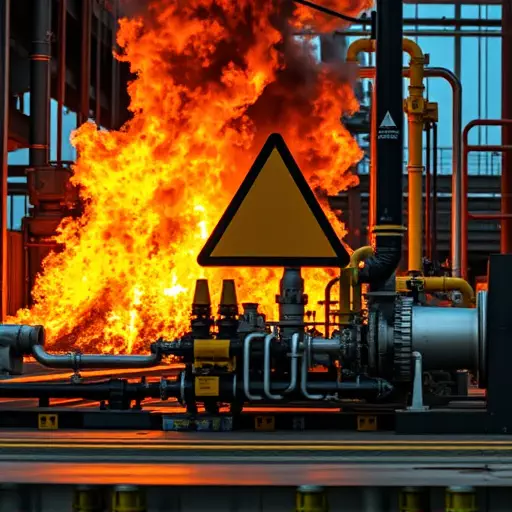Cybersecurity Integration in Process Safety: Unveiling Digital Risks & Best Practices
In industrial cybersecurity, Process Safety Management Consulting relies on advanced Hazard Identifi…….
Introduction
In an era where industries are increasingly complex and safety is paramount, the role of Process Safety Management (PSM) Consulting has become indispensable. This article delves into the multifaceted world of PSM Consulting, exploring its core tenets, global impact, economic implications, technological advancements, regulatory landscape, challenges, and future prospects. By the end of this exploration, readers will have a comprehensive understanding of how PSM Consulting safeguards human life, protects the environment, and enhances operational efficiency in various industries.
Understanding Process Safety Management Consulting
Process Safety Management Consulting is a specialized service that assists organizations in managing the risks associated with hazardous processes. It encompasses a systematic approach to the prevention of incidents involving highly hazardous materials that could cause a catastrophic release. The core components of PSM include risk assessment, process hazard analysis, safe design, operational control, training, and audit procedures.
Historically, PSM evolved from the need to address safety issues in the chemical industry, particularly after significant incidents like the Bhopal disaster in 1984. Today, it is a critical aspect of industrial operations across various sectors, including oil and gas, pharmaceuticals, and manufacturing. Its significance lies in its ability to integrate principles, practices, and systems that prevent process-related hazards and mitigate their potential impact on human health and the environment.
Global Impact and Trends
The influence of PSM Consulting is felt worldwide, with different regions adopting it at varying paces due to regulatory requirements, industrial diversity, and economic conditions. North America, Europe, and parts of Asia have robust frameworks for PSM, while emerging economies are increasingly recognizing its importance as they develop their industrial sectors.
Key trends shaping the trajectory of PSM Consulting include the adoption of digital technologies, the growing emphasis on sustainability, and the need for compliance with stringent safety regulations. The globalization of industries also necessitates a harmonized approach to process safety across different jurisdictions. For instance, the Global Safety and Incident Monitoring Benchmark (GSIMB) provides a platform for sharing best practices and lessons learned in process safety management.
Economic Considerations
The economic aspects of PSM Consulting are significant. It can influence market dynamics by driving investments in safer, more efficient processes. The cost-benefit analysis of PSM shows that the initial investment in safety measures can prevent catastrophic failures, which, if not managed properly, could lead to enormous financial losses, legal liabilities, and reputational damage.
Investment patterns in PSM Consulting are shaped by factors such as regulatory changes, technological advancements, and industry-specific risk profiles. The role of PSM Consulting in economic systems is to optimize safety while maintaining productivity, thus contributing to a sustainable and resilient industrial landscape.
Technological Advancements
Technology plays a pivotal role in the advancement of PSM Consulting. Innovations such as real-time monitoring systems, advanced analytics, artificial intelligence (AI), and machine learning are revolutionizing the way process safety is managed. These technologies enable predictive maintenance, better risk assessment, and more effective incident response strategies.
The future potential of technology in PSM Consulting includes the integration of IoT devices for real-time data collection, AI-driven simulation models for hazard analysis, and blockchain for improved traceability and accountability. These advancements promise to enhance process safety management’s effectiveness and efficiency.
Policy and Regulation
The regulatory framework governing PSM Consulting is characterized by a set of policies and regulations that vary by region but share common objectives: to prevent accidents, mitigate their impact, and ensure compliance with safety standards. In the United States, the Occupational Safety and Health Administration (OSHA) provides guidelines for PSM, while international bodies like the International Association of Classification Societies (IACS) and the International Labour Organization (ILO) also set forth standards.
Legislation such as the Clean Air Act Amendments in the U.S., Seveso III Directive in Europe, and the Canadian Environmental Protection Act influence the development and implementation of PSM programs. These regulations not only protect workers and communities but also ensure that companies adhere to best practices in process safety management.
Challenges and Criticisms
Despite its critical role, PSM Consulting faces challenges such as evolving regulatory landscapes, the complexity of global supply chains, and the need for continuous technological adaptation. Criticisms include the perception that PSM can stifle innovation by overly constraining process design and operation. Additionally, there is a need for consistent application of PSM principles across all sectors, including small to medium-sized enterprises (SMEs) that may lack the resources for comprehensive safety programs.
To overcome these issues, stakeholders must collaborate to develop flexible, risk-based PSM approaches that encourage innovation while maintaining safety. Training and education are key in ensuring that all levels of an organization understand and implement PSM principles effectively.
Case Studies
Several case studies illustrate the successful application of PSM Consulting. For instance, the Buncefield incident in 2005 led to a comprehensive review of the UK’s oil storage terminals, resulting in improved safety measures and the adoption of stricter PSM standards. Another example is the DuPont explosions in 2014 and 2015, which prompted the company to reassess its approach to process safety, leading to significant improvements in their risk management practices.
These case studies underscore the importance of a robust PSM program in preventing accidents and managing risks effectively. They also highlight the need for continuous learning and adaptation within the industry.
Conclusion
Process Safety Management Consulting is an indispensable aspect of modern industrial operations, with a global impact that extends beyond safety to economic and environmental sustainability. Through a combination of stringent regulations, technological innovation, and a commitment to continuous improvement, the industry can enhance process safety and protect workers, communities, and the environment from potential hazards. As industries evolve, so too must the strategies for managing process safety, ensuring that PSM Consulting remains at the forefront of safeguarding industrial operations worldwide.
This content provides a comprehensive overview of Process Safety Management (PSM) Consulting, touching on its historical context, global impact, economic considerations, technological advancements, regulatory framework, challenges and criticisms, and real-world case studies. It underscores the critical role that PSM plays in ensuring safe industrial operations and its importance in the broader context of safety, sustainability, and economic resilience.

In industrial cybersecurity, Process Safety Management Consulting relies on advanced Hazard Identifi…….

Process Safety Management (PSM) relies on hazard identification techniques, particularly Process Haz…….

Process Safety Management (PSM) consulting leverages advanced hazard identification techniques and P…….

Embracing human factors is key to enhancing process safety through process safety management consult…….

PSM Compliance Audits are essential for maintaining safe industrial processes by assessing documenta…….

Process Safety Management Consulting (PSMC) specializes in identifying and mitigating risks within i…….

Emergency response planning is a critical component of Process Safety Management (PSM) consulting, a…….

Process Safety Management Consulting (PSM) is a specialized service ensuring safe industrial operati…….

Process Safety Management Consulting offers expert solutions for secure and efficient industrial pro…….

In process safety management consulting, Management of Change (MOC) is vital for controlling and ass…….